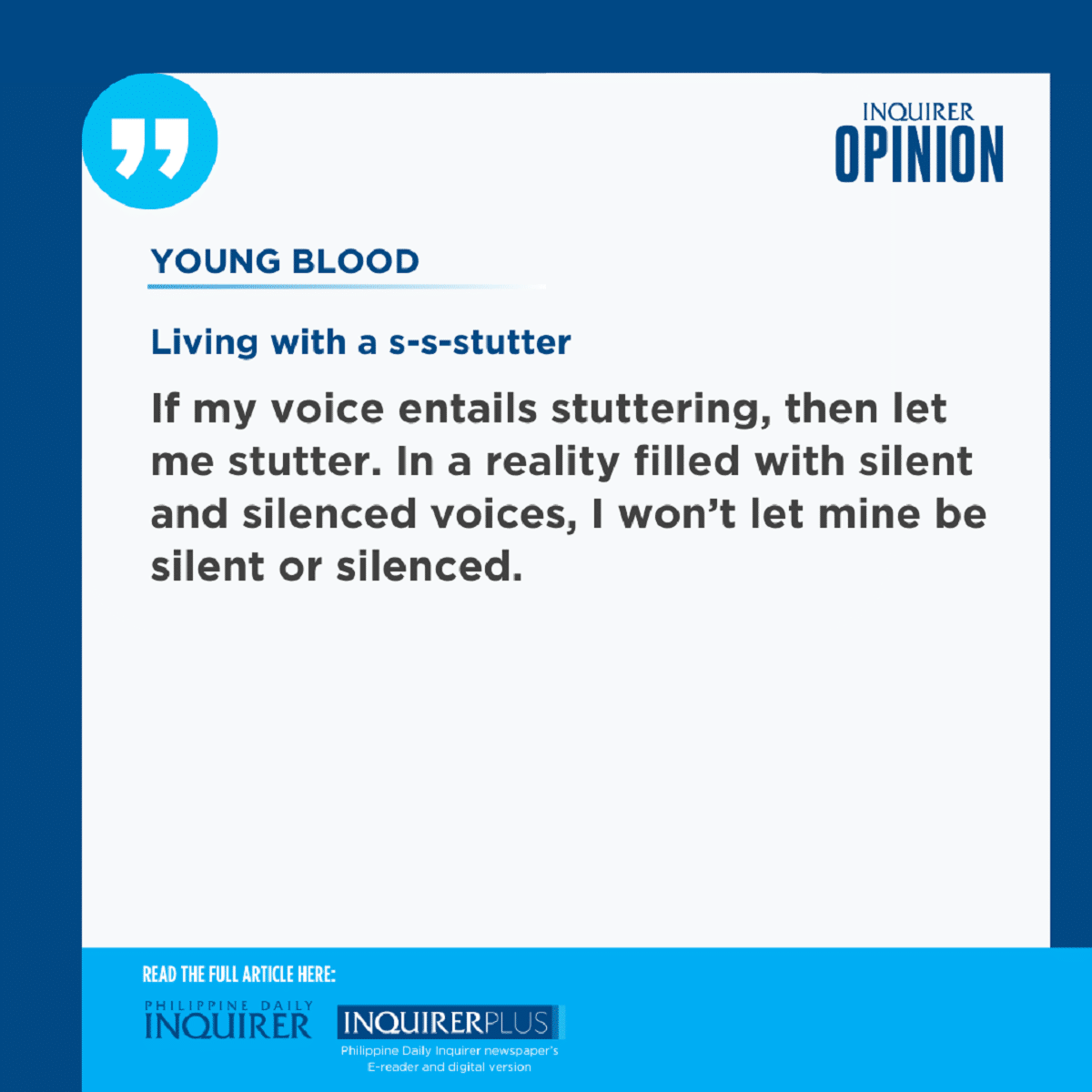Living with a s-s-stutter
By: Allen Gacutan
- 3 months ago


I–I-I-I-I-I’m a stutterer. I s-s-stammer.
I’ve always stuttered since I was a child. I wasn’t aware and conscious of it until senior high school and college. I often stuttered in class due to several reasons such as anxiety, low self-esteem, or nervousness. I would be surprised when a professor or classmate made a face or was shocked due to a stutter. It was in these moments when I felt negatively different and alienated from others.
By definition, stuttering or stammering is a speech condition that disrupts the normal flow of speech and rhythm, and is characterized by the repetition of syllables. In Filipino, we understand this phenomenon as “pag-uutal.” Generally, stuttering is a normal human speech condition. Some stutter due to anxiety, some because of a sudden blank-slated mind, but it’s always on a case-to-case basis.
In my case, I stutter every day. I would struggle to say my name when introducing myself. It would take a few seconds to utter the vowel “A” before connecting the “Llen.” Asking for service water in a restaurant would take a few pauses to start saying “pahingi po ng tubig.”
Every single day, it felt as if my tongue was nonfunctional—twisting and turning—before I could utter a simple word in a conversation.If I couldn’t pronounce “
pahingi po ng tubig,” I would find an alternative like “
isa nga pong tubig” because “
isa” could be easier to pronounce at any given moment. If I find difficulty in saying “thank you,” I would omit the “t” and just say “hank you” to let others complete the sentence on their own. Another instance would be avoiding words that start with plosive letters such as d, t, k, g, and p. This was due to how my stuttering was more prone to these types of sounds. All of these solutions and alternatives are personalized to cater to my struggle.Whenever I stutter, a series of questions come to mind.
Bakit ang malas ko? Bakit ako utal nang utal? Bakit ang swerte ng ibang hindi nauutal? At higit sa lahat, bakit ako nabuhay nang may utal? Every day was a struggle after another.
To utter a word after another felt almost a light-year away yet in reality, was likely fast as a snap of a finger. I thought of stuttering as a characteristic hindering my character growth. An impediment leeching away my intrinsic talent.
Ultimately, I considered stuttering as a disorder, and extensively, more of a disability. It came to a point where I channeled my energy by speaking less than usual.
Eventually, I found this in the discipline of student journalism—where I was forced to write more than speak. Writing felt like the easiest escape to avoid speaking and found solace in it.
It was in journalism that I mustered the courage to express my ideas without having to second-guess and feel frustrated. It was in writing that I realized a passion for letting my ideas flourish and be valued.
Fast forward to today, I may have developed my writing but my stuttering never left—it is already engraved in the daily occurrence of living. Reflecting on my alternatives, journalism wasn’t a solution in itself.
My stuttering felt like a disability more than a natural condition, I considered my stuttering as an entity apart from the “real self.” A doppelganger. An alter ego of sorts. However, it was more a shadow, ever so present, that I couldn’t escape.
Realizing it more in-depth, stuttering is inherently a gift of the ability to speak and have a voice. If my voice entails stuttering, then let me stutter. In a reality filled with silent and silenced voices, I won’t let mine be silent or silenced. I have a voice, I can speak. Speaking is not solely a means to an end.
Ultimately, the act of speaking up is an end in itself, a value in itself.To speak, even when I stutter, persists in exhibiting a voice of my genuine self. A thought akin to my being. Stuttering may be a disability or a speech disorder, but it gives “Allen the Stutterer” more of a definition—an essence and purpose of the self to live in solace with his humanness.
A self not bounded by stuttering, but more an added meaning of the self as all-encompassing of his lived experiences. In Filipino, binibigyan tayo ng depinisyon ng ating mga kapansanan, nang sa ganoon mamuhay tayo nang panatag at mataimtim sa pagka-ako ng ako.
If Allen the Stutterer is one who comes to terms with his flaws, inadequacies, and more importantly, his truest self, then so be it. I’ll be Allen the Stutterer forever,
magsalita hangga’t kayang magsalita, mautal man kung mautal.
Allen Gacutan, 20, is a philosophy student currently involved in student journalism and literary organizations at the Ateneo De Manila University.


